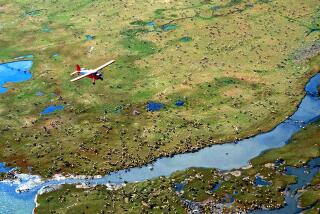‘Exploration vs. Wildlife’
- Share via
Your editorial (April 23), “Exploration vs. Wildlife,” points out the difficulty and complexity of the decision facing Congress regarding whether and how to explore for oil in the Arctic National Wildlife Refuge. The Times ignores two important lessons already learned on the North Slope in two areas.
First, you are frustrated because more information cannot be found to substantiate industry hopes for a large discovery of oil. We are equally frustrated, but Mother Nature has the key, certainly not the oil industry.
The fact that potential discovery areas may initially be identified on the basis of exploration theories developed by industry should not lead you to scornfully say, “It virtually always is an all-or-nothing proposition with the oil boys deciding where to drill and when.” Anyone with an idea and an exploration fund can participate in a lease sale. The risks and expenses are enormous, as the federal government learned by drilling wells themselves in the national petroleum reserve in Alaska without the advantage of industry’s competitive means to generate ideas for finding the keys to Mother Nature’s riddle hiding the oil deposits.
Without question, industry drills non-productive wells, but the current system takes advantage of the resources and ideas industry provides and is an open process. If the oil is there, industry’s chance of finding it is far better than the government’s.
Second, the Prudhoe Bay field just west of the wildlife refuge has demonstrated industry’s ability to produce oil and protect the environment. Indeed, the caribou herd there has nearly tripled in size since the oil facilities were installed. The proximity of the refuge to Prudhoe Bay will eliminate the need for a pipeline to carry oil great distances, thus reducing environmental impacts.
Alaskan oil from the Prudhoe Bay field currently provides 20% of America’s oil supply and one-third of California’s needs, but that production is beginning to decline. An environmentally sensitive plan to bring on new supplies from the wildlife refuge must begin now to assure adequate energy for California and the nation in the future.
DOUGLAS F. HENDERSON
Los Angeles
Henderson is executive director of the Western Oil and Gas Assn.


